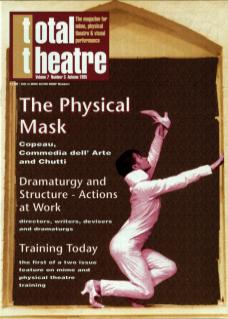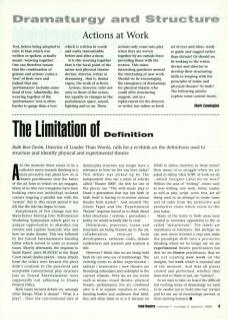At the moment there seems to be a collective move towards thinking in a more proactive way about how we as theatre practitioners view the future of the artform in which we are engaged. Many of us who run companies have been holding onto our individual isolated corners waging a painful war with the 'system'. But in this recent period it has felt like the tide has begun to turn.
Symptomatic of this change was the Manchester Moving Into Performance Workshop Symposium, which gave us a unique opportunity to abandon our corners and explore honestly why and how we make theatre. This was followed by the Forced Entertainment funding lobby which served to unite us around issues. Shortly afterwards, the response to Sarah Kane’s piece Blasted at the Royal Court raised similar points – many attacks from the critics were because the piece didn't conform to the perceived and acceptable conventional play structure just as Forced Entertainment were supposedly not adhering to Drama Projects Policy.
Both issues focused debate on, amongst other things: What is drama? What is a play? Does the conventional idea of drama/play structure any longer have a relevance to how we live our lives today? This debate was picked up by The Independent who ran a series of articles called ‘Theatre 2000’; the title for one of the pieces ran ‘The well-made play is Dead: a generation that has lost faith in faith itself is having to re-invent serious theatre from scratch’. And recently The Green Paper and the 'Experimental Theatre' response forced us to think about what structures / systems / procedures / policy we would actually like to exist.
Definitions, processes, forms and structures are being thrown up in the air, collaboration, cross-artform development, art house clubs, debate, conferences, and research and analysis is rife.
However, I think that we are being held back by our own use of terminology. The existing terms to define experimental / radical / innovative / new theatre are becoming redundant and unhelpful in the current climate. Why do we use terms such as mime, visual theatre, physical theatre, performance, live art, combined arts? Is it to explain ourselves to critics, funding bodies and audiences that label, box and often limit us or is it because we WISH to define ourselves in those terms? How many of us struggle when we are asked to define what SORT of work we do – which Designer Label do we wear? Within the area of ‘writing’, terms such as new writing, new work, writer, creator as well as play, script, score, text, are all being used in an attempt to create some sort of order from the instinctive and productive chaos which exists in this area today.
Many of the terms in both areas were created as necessary opposition to the so called ‘mainstream’. The labels are manifestos of resistance. But perhaps we can now move forward a step and make the paradigm shift into a proactive thinking where we no longer say we are experimental theatre practitioners but that we are theatre practitioners, that we are not creating new work on the margins, but work which is essential and of the moment. And that all pieces created and performed, whether they have text in them or not, are ‘written’.
As we start to take on board the difficult but exciting issues of dramaturgy we need to be careful not to hold onto our corners and let our use of terminology prevent us from moving forward.

